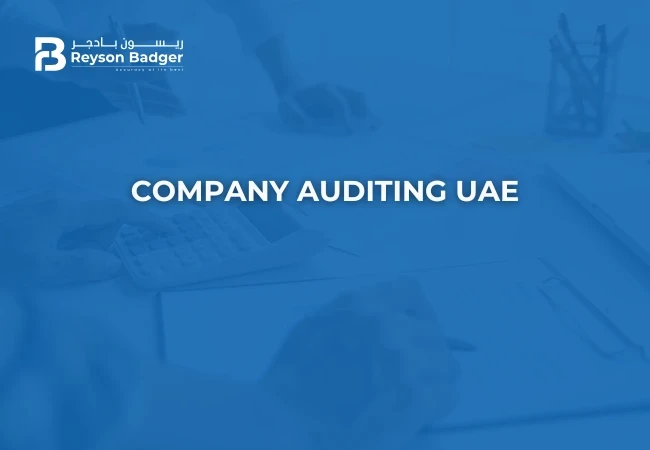
Company auditing in the United Arab Emirates is more than a legal requirement but the very bedrock of financial transparency, accountability, and compliance. It helps stakeholders to view an organization's financial health and thereby adhere to UAE laws in the protection of interests by shareholders, partners, and investors. For business holders, it is essential to know the auditor's process and its important role in building trust in their business, reducing money risks, and increasing validity in the competitive UAE environment. Find more about company audits in UAE, exploring types, benefits, and more requirements.

Several audits exist within this entity to enforce compliance, efficiency, and accountability within the organizations. The types of audits include statutory audits, internal audits, compliance audits, and operational audits.
1. Statutory Audit:
A statutory audit is a legally mandated audit of financial statements for certain types of entities in the United Arab Emirates. The requirements for this audit are typically provided by local laws and regulations, specifically the UAE Commercial Companies Law, under which companies are mandated to have their financial statements audited annually.
Key Features:
2. Internal Audit
Internal auditing constitutes a professionally conducted, independent evaluation of an organization's internal controls, risk management processes, and governance. Employees or consultants offer ideas on either operational efficiencies or managing an organization in strict compliance.
Key Features:
3. Compliance Audit
Compliance audit ensures that an organization complies with the external regulations or internal policies governing its operations. This audit is essential in sectors highly regulated by several laws and standards.
Key Features:
4. Operational Audit
An operational audit checks the efficiency and effectiveness of an organization's operations. Such an audit is meant to ascertain if the resources are utilized optimally to reach the organizational objectives.
Major Features:
Auditing is a process that is pivotal to any business and may offer various benefits such as credibility, proper financial handling, minimization of associated risks, and regulatory requirements. Some of the paramount benefits of auditing for firms in the UAE include;
1. Accepted Credibility
Independently auditing verifies the presence and validity of a company's financial statements to precisely describe the financial status of that organization. This fair auditing increases stakeholders' trust particularly among investors, creditors, and customers since the same financial information is positive to be not altered or overemphasized.
2. Improved Financial Management
Audits help organizations discover areas of improvement in financial management through detailed examination of financial transactions and internal controls. Audits contribute to budgeting, forecasting, and resource allocation with better efficiency because of highlight inefficiencies and provide recommendations for improvement in budgeting and forecasting.
3. Risk Management
Audits are very essential for detecting and mitigating potential risks that an organization may face. Upon reviewing internal controls and operational procedures, auditors identify weaknesses likely to lead to potential fraud, financial misstatements, or inefficiencies in operations. This will enable an organization to strengthen risk management strategies and implement controls to reduce risk exposure.
4. Compliance with UAE Laws
In the UAE, some firms are statutorily required to undergo annual audits in line with the UAE Companies Law and regulations of institutions like the Central Bank of the UAE. Auditing ensures that such firms are within the bounds of local law and standards, thereby avoiding legal consequences and ensuring a culture of accountability and compliance.
The regulatory landscape of the UAE specifies the exact auditing requirements organizations must fulfill for accountability and transparency. Some of the primary regulatory requirements for audits in the UAE are:
1. UAE Companies Law
According to the UAE Companies Law, particular firms, for example, public joint-stock companies or companies by size and revenue, need to be annually audited by a licensed auditor, which will be used for enforcing transparency and accountability through financial reports of large entities.
2. Laws of Central Bank of UAE
The Central Bank of the UAE mandates financial institutions based in the UAE to adhere to other regulations, including conducting regular audits to ascertain whether such institutions comply with banking legislation. Financial stability and public confidence can thus be achieved through the same.
3. Free Zone Authority Requirements
For companies based in free zones in the UAE, specific auditing requirements are imposed by the respective Free Zone Authorities. Usually, such companies need to submit annual audited statements so they do not lose their licenses and the operational status within the region.
4. IFRS: International Financial Reporting Standards
Companies that are listed on stock exchanges or those with international operations must have financial statements prepared based on the International Financial Reporting Standards (IFRS). IFRS audits would guarantee that financial statements have complied with global standards of transparency and accountability, especially for multinational or publicly listed companies.
Preparing thoroughly for an audit ensures a streamlined process and contributes to accurate, reliable results. Here are essential steps organizations should take to get audit-ready:
1. Maintaining Accurate Financial Records
Organizations must keep accurate, up-to-date financial records, including transactions, receipts, invoices, and supporting documents. This practice not only eases the audit process but also maintains compliance with regulatory standards and provides a transparent view of the company’s financial health. By ensuring all records are meticulously organized, companies set a solid foundation for a smooth audit.
2. Implementing Internal Controls
Strong internal controls are critical for safeguarding assets and maintaining financial accuracy. These controls help prevent errors, fraud, and inefficiencies, making it easier for auditors to verify the integrity of financial statements. From approval protocols to segregation of duties, effective internal controls streamline the audit process, helping organizations meet regulatory requirements and align with best practices.
3. Conducting Regular Risk Assessments
Regular risk assessments allow organizations to identify potential vulnerabilities in their financial reporting and operations. By proactively addressing these risks, companies can bolster audit readiness and reassure auditors that they are effectively managing risks. This ongoing process also reinforces internal controls and reduces the likelihood of unexpected audit findings.
4. Engaging a Reputable Auditor
Choosing the right auditor is essential for a reliable audit process. Organizations should select auditors who are registered with relevant UAE regulatory bodies, such as the Ministry of Economy, and who have a proven industry track record. Reputable auditors bring credibility to the audit, helping organizations to meet legal requirements and gain stakeholders' confidence.
Choosing the appropriate auditor improves regulatory compliance, credibility, and financial oversight. Here are some important things to think about:
1. The Ministry of Economy Auditors that are Registered
Verify that the auditing company is listed with the Ministry of Economy in UAE. By confirming compliance with UAE auditing standards and regulatory criteria, registration guarantees that the auditor is certified to do audits in the United Arab Emirates.
2. Membership in the UAE Auditing Association
Think about auditors who belong to associations for professionals, like the UAE Auditing Association. Membership highlights the firm's commitment to quality and integrity in audit practices by signifying a dedication to high professional standards, ethics, and ongoing education.
3. Experience and Knowledge of the Industry
Consider the auditor's background, especially in your sector. Beyond the fundamental audit procedure, a company with industry-specific expertise can meet regulatory obligations, provide insights into best practices, and provide value.
4. Self-reliance and Impartiality
Select auditors who value impartiality and independence in their work. Building confidence with stakeholders requires the audit findings to be objective and reliable, which independence guarantees. A clear, impartial audit increases credibility by fostering trust in the company's financial statements.
Auditing of companies in the UAE is a concept well-linked with financial integrity and regulatory compliance. The question therefore arises as to what type of audits are available, and what are their benefits and requirements to empower businesses in going ahead with the auditing process. For an incident-free and compliant audit, consider collaborating with one of the famous auditing providers in the UAE. Reyson Badger ensures that your business is not only financially healthy but in full compliance with all regulations, with their experience in local regulation and a commitment to sound standards.
Ready to strengthen your business with professional auditing support? Talk to Reyson Badger today to explore tailored solutions for your organization.